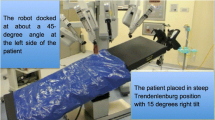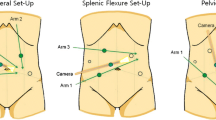Abstract
Background
Robotic surgery offers 3D visualization and the advantage of the usage of multi-articulated instruments with superior dexterity. Theoretically, it can overcome many limitations of laparoscopic rectal surgery in the narrow pelvis.
Materials and Methods
Between January 2010 and January 2011, the patients who underwent robotic rectal resection for cancer were retrospectively evaluated in terms of demographics, operative data, complications, the duration of hospital stay, and histopathological data.
Results
Thirty consecutive patients made up of 13 female and 17 male patients underwent robotic rectal resection. Sphincter-saving mesorectal excision was performed in 27 patients. Of these, there were 19 total and 8 partial mesorectal excisions. The mean operative time was 270 min (175–480 min). The median postoperative hospital stay was 4 days (4–20 days). No operation was converted. The complication rate was 13.3%. One patient died due to colonic necrosis caused by Drummond artery deficiency (3.3%). The median number of harvested lymph nodes was 15 (3–38), and the distal resection margin was 4 cm (2–8). Histopathological evaluation revealed that the mesorectum resection was complete in all patients.
Conclusion
Robotic rectal surgery (hybrid or totally robotic) is a safe and feasible procedure when performed by experienced laparoscopic surgeons.


Similar content being viewed by others
References
Baik SH, Kwon HY, Kim JS, Hur H, Sohn SK, Cho CH, Kim H. Robotic versus laparoscopic low anterior resection of rectal cancer: short-term outcome of a prospective comparative study. Ann Surg Oncol 2009;16:1480–1487.
Baek JH, McKenzie S, Garcia-Aguilar J, Pigazzi A. Oncologic outcomes of robotic-assisted total mesorectal excision for the treatment of rectal cancer. Ann Surg 2010;251:882–886.
Bianchi PP, Ceriani C, Locatelli A, Spinoglio G, Zampino MG, Sonzogni A, Crosta C, Andreoni B. Robotic versus laparoscopic total mesorectal excision for rectal cancer: a comparative analysis of oncological safety and short-term outcomes. Surg Endosc 2010;24:2888–2894.
Pigazzi A, Luca F, Patriti A, Valvo M, Ceccarelli G, Casciola L, Biffi R, Garcia-Aguilar J, Baek JH. Multicentric study on robotic tumor-specific mesorectal excision for the treatment of rectal cancer. Ann Surg Oncol 2010;17:1614–1620.
Choi DJ, Kim SH, Lee PJ, Kim J, Woo SU. Single-stage totally robotic dissection for rectal cancer surgery: technique and short-term outcome in 50 consecutive patients. Dis Colon Rectum 2009;52:1824–1830.
Maeso S, Reza M, Mayol JA, Blasco JA, Guerra M, Andradas E, Plana MN. Efficacy of the Da Vinci surgical system in abdominal surgery compared with that of laparoscopy: a systematic review and meta-analysis. Ann Surg 2010;252:254–262.
Karahasanoglu T, Hamzaoglu I, Baca B, Aytac E, Kirbiyik E. Impact of increased body mass index on laparoscopic surgery for rectal cancer. Eur Surg Res 2011;46:87–93.
Chapter in book 4: Bowers SP, Hunter JG. Contraindications to Laparoscopy. In Whelan RL, Fleshman JW, Fowler DL, eds. The SAGES Manual of Perioperative Care in Minimally Invasive Surgery (Whelan, the Sages Manual) New York: Springer, 2006 pp 25–32).
Quirke P, Durdey P, Dixon MF, Williams NS. Local recurrence of rectal adenocarcinoma due to inadequate surgical resection. Histopathological study of lateral tumour spread and surgical excision. Lancet 1986;2:996–999.
The Clinical Outcomes of Surgical Therapy Study Group. A comparison of laparoscopically assisted and open colectomy for colon cancer. N Engl J Med 2004;350:2050–2059.
Guillou PJ, Quirke P, Thorpe H, Walker J, Jayne DG, Smith AM, Heath RM, Brown JM. Short-term endpoints of conventional versus laparoscopic-assisted surgery in patients with colorectal cancer (MRC CLASICC trial): multicentre, randomised controlled trial. Lancet 2005;365:1718–1726.
Neudecker J, Klein F, Bittner R, Carus T, Stroux A, Schwenk W. Short-term otcomes from a prospective randomized trial comparing laparoscopic and open surgery for colorectal cancer. Br J Surg 2009;96:1458–1467.
Hellan M, Anderson C, Ellenhorn JD, Paz B, Pigazzi A. Short-term outcomes after robotic-assisted total mesorectal excision for rectal cancer. Ann Surg Oncol 2007;14:3168–3173.
Patriti A, Ceccarelli G, Bartoli A, Spaziani A, Biancafarina A, Casciola L. Short- and medium-term outcome of robot-assisted and traditional laparoscopic rectal resection. JSLS 2009;13:176–183.
Hellan M, Stein H, Pigazzi A. Totally robotic low anterior resection with total mesorectal excision and splenic flexure mobilization. Surg Endosc 2009;23:447–451.
Park YA, Kim JM, Kim SA, Min BS, Kim NK, Sohn SK, Lee KY. Totally robotic surgery for rectal cancer: from splenic flexure to pelvic floor in one setup. Surg Endosc 2010;24:715–720.
Baik SH, Ko YT, Kang CM, Lee WJ, Kim NK, Sohn SK, Chi HS, Cho CH. Robotic tumor-specific mesorectal excision of rectal cancer: short-term outcome of a pilot randomized trial. Surg Endosc 2008;22:1601–1608.
Ahlering TE, Skarecky D, Lee D, Clayman RV. Successful transfer of open surgical skills to a laparoscopic environment using a robotic interface: initial experience with laparoscopic radical prostatectomy. J Urol 2003;170:1738–1741.
Hamzaoglu I, Karahasanoglu T, Aytac E, Karatas A, Baca B. Transumbilical totally laparoscopic single-port Nissen fundoplication: a new method of liver retraction: the Istanbul technique. J Gastrointest Surg 2010;14:1035–1039.
Hamzaoglu I, Karahasanoglu T, Baca B, Karatas A, Aytac E, Kahya AS. Single-port laparoscopic sphincter-saving mesorectal excision for rectal cancer: report of the first 4 human cases. Arch Surg 2011;146:75–81.
Mirnezami AH, Mirnezami R, Venkatasubramaniam AK, Chandrakumaran K, Cecil TD, Moran BJ. Robotic colorectal surgery: hype or new hope? A systematic review of robotics in colorectal surgery. Colorectal Dis 2010;12:1084–1093.
Acknowledgments
The authors thank Professor Ali Rıza Kural for his contributions and constructive support.
Disclaimers
None of the authors have disclosures/disclaimers to report.
Author information
Authors and Affiliations
Corresponding author
Additional information
Research support
This work was not supported by any company or institute.
Prior presentation
This study has not been presented in any form prior to this submission/publication.
Rights and permissions
About this article
Cite this article
Karahasanoglu, T., Hamzaoglu, I., Baca, B. et al. Robotic Surgery for Rectal Cancer: Initial Experience from 30 Consecutive Patients. J Gastrointest Surg 16, 401–407 (2012). https://doi.org/10.1007/s11605-011-1737-x
Received:
Accepted:
Published:
Issue Date:
DOI: https://doi.org/10.1007/s11605-011-1737-x




